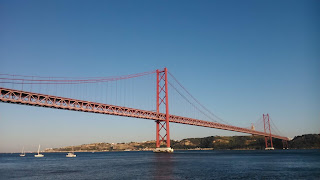Note: English version below.
Nós vivemos na margem sul do Rio
Tejo – o rio mais longo da Península Ibérica. Para chegarmos a Lisboa temos
duas opções – apanhar o autocarro ou o barco.
Quando digo à minha família e amigos
na Polónia que apanho o barco para ir a Lisboa ficam todos muito curiosos. Por
isso gosto de lhes enviar fotografias engraçadas de mim a fingir ser
um marinheiro forte a usar os meus músculos para controlar o barco. A verdade é
que é um barco de dois andares, com bastante espaço, e sentes mais que estás
num “táxi aquático” do que propriamente um imigrante à espera de ver terra.
Outro facto interessante sobre os
transportes públicos aqui é estimar a hora de chegada dos autocarros a uma
determinada paragem. É preciso ser muito bom em matemática e ter um pensamento
lógico bem desenvolvido para o conseguir. No início limitava-me a seguir os
outros voluntários, nem tentava aprender esta arte de “adivinhar” os horários
do autocarro. Quando apanhas o autocarro na estação inicial tudo é mais fácil,
mas torna-se mais complicado quando precisas de apanhar o autocarro numa
paragem a meio do percurso. Precisas de saber quanto tempo mais ou menos o
autocarro leva do ponto A ao ponto B e a partir daí calcular a hora de chegada
do autocarro à paragem que pretendes. É sempre um mistério e é com alguma
impaciência que aguardamos para descobrir se conseguimos acertar ou não. Já nos
aconteceu as duas coisas – acertar e falhar redondamente.
Em Portugal temos de levar as coisas
com calma, relaxar e aproveitar o bom tempo enquanto esperamos pelo autocarro
ou pelo barco. Podemos beber um café, conversar com pessoas locais – o mais
provável é partilharem a mesma frustração que nós e essa partilha acaba por nos
fazer sentir mais próximos!
A Portuguese Adventure - Traveling by boat and mathematics
We are living on the other side of the Tagus river – the longest river of
the Iberian Peninsula.
To get to Lisbon we have two options of travelling – going by bus or by boat (here: barco).
When I tell my family and friends in Poland about my boat travel to Lisbon they are usually very curious how it looks like. Then I enjoy sharing a funny picture with them – me as an immigrant sailing the boat like a strongman, using all the muscles of the hands. In reality it is a two-storey ship with much space and you rather feel like on a board of a waterbus than as a real immigrant waiting till shore of land appears.
To get to Lisbon we have two options of travelling – going by bus or by boat (here: barco).
When I tell my family and friends in Poland about my boat travel to Lisbon they are usually very curious how it looks like. Then I enjoy sharing a funny picture with them – me as an immigrant sailing the boat like a strongman, using all the muscles of the hands. In reality it is a two-storey ship with much space and you rather feel like on a board of a waterbus than as a real immigrant waiting till shore of land appears.
Another
interesting feature about travelling here by public transport is estimating
time of bus arrival to a particular bus stop. You need to be very good in
mathematics and logical thinking as well. At the beginning I was following
others, not interested in learning ability of “guessing” an hour when the bus
comes J The easiest is when you travel from the first bus stop – it
is obvious while checking time in the schedule. It is becoming more complicated
as you want to get on the bus somewhere in the middle of the way from one town
to another. You need to know more and less how long the bus is going from A to
B point and relying on this information you can calculate the estimated time of
arrival. It’s always kind of mystery and impatience if we have managed to
estimate time properly or not. It happens both that we succeed in this matter
and fail it.
In
Portugal just take it easy, relax, enjoy weather and while waiting for a bus or
a boat drink coffee and talk to stranger on the street – he probably feels the
same as you and sharing the same experience can get you closer to each other!~
Karolina Piérog
Karolina Piérog


Sem comentários:
Enviar um comentário